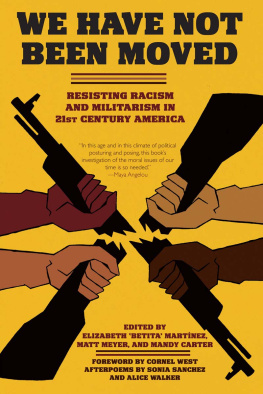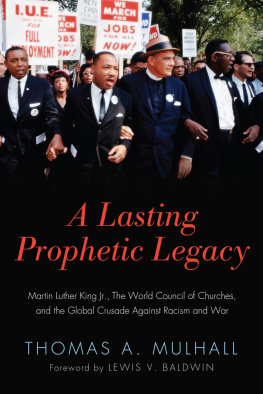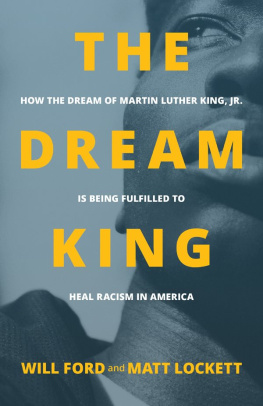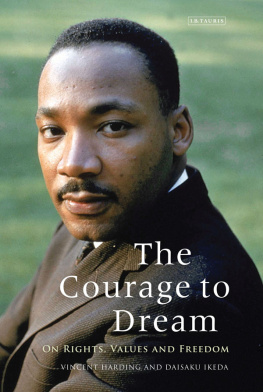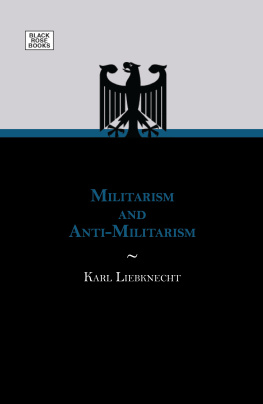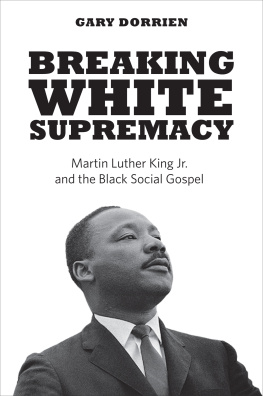Praise
When we sang out We Shall Not Be Moved in Montgomery and Selma, we were committed to our unshakeable unity against segregation and violence. This important book continues in that strugglesuggesting ways in which we need to do better, and actions we must take against war and continued racism today. If the human race is still here in 2112, the War Resisters League will be one of the reasons why!
Pete Seeger, folk singer
In this age and in this climate of political posturing and posing, this books investigation of the moral issues of our time is so needed. I commend Meyers, Martnezs, and Carters insights, their intelligence, and their courage.
Dr. Maya Angelou
We Have Not Been Moved recounts so many aspects of our work for civil and human rights, evoking the songs, stories, and struggles that strengthened both our communities and our moral scaffolding as a nation. Matt Meyer, Elizabeth Betita Martnez, and Mandy Carter provide new generations with much-needed context and connection to our historic struggles, so that we may forge stronger communities and a more resilient movement for the twenty-first century.
Ruby Dee, actress, playwright, and activist
For some it may not be easy to see how racism and militarism, two of Dr. Kings Giant Triplets, are joined at the hip, but this book connects the dots very well. Now, in the twenty-first century, this collection of writing punctuates his challenge to us with a bold exclamation point!
Oskar Castro, executive director of Military Families Speak; senior program analyst for the American Friends Service Committee
Years ago, I joined with thousands of like-minded people to help bring about peace to the people of Vieques, Puerto Rico. Two thirds of their island was occupied by the U.S. Navy, which used it for military exercises, including bombing with live ammunition near civilian homes and work places. Then, I called that both immoral and abusive. More recently, I have been arrested twice for civil disobedience as I continue to bring attention to the plight of hundreds of thousands of immigrants and American citizens whose families are being divided by an unjust and broken immigration system. I believe that in order to reach a moral center-pointas called for by Dr. Martin Luther King Jr.this nation must live up to the true meaning of our creed and achieve in deed what we have long aspired to in our lofty documents and rhetoric. This means rejecting militarism and racism in all forms. True peace and security can only come from true democracy and justice. While it is nearly impossible to agree, or to disagree, with the totality of this or any other book, I applaud the ways in which We Have Not Been Moved helps us sharpen our understanding of these moral and social imperatives. This book is in the best tradition of civil and human rights movements and a welcome addition to the literature on these crucial issues.
Congressman Luis V. Gutirrez, (D-IL)
In an era of rampant militarism, growing anti-Islamic sentiment, and racist violence, the essays in We Have Not Been Moved provide us with urgently needed analytical frameworks and on-the-ground strategies for challenging structural injustice. The wide range of voices in this collection, spanning generations and social movements, remind us of the interconnectedness of our struggles against racism, militarism, violence, and injustice, and collectively urge us to build a unified, principled movement to resist intensified empire.
Angela Y. Davis, author, activist, and professor emerita, History of Consciousness, UCSanta Cruz
With extraordinary clarity and courage, We Have Not Been Moved marches up to the elephant in the room, looks it in the eye, and gives it a mighty shove toward the door. This book firmly and clearly addresses the contradictions which have kept us from building a united movement for peace, justice, and freedom across racial and cultural lines. No book has ever been more badly needed by all who yearn and struggle for a more just and peaceful world.
Rev. Dr. C. Nozomi Ikuta, chair, Interfaith Prisoners of Conscience Project
We Have Not Been Moved brings together a most powerful collection of essays that bear witness to the violence people are capable of inflicting on each other. This book directly confronts U.S. imperialism, and the racism and voracious materialism that undergird it. By boldly naming and immersing us in histories of injustice, the authors challenge us to embrace humanity and work for peace.
Christine Sleeter, professor emerita, California State University, Monterey Bay; president, National Association for Multicultural Education
What is to be Undone. An often scathing, sometimes inspiring, and never comforting look at the tangled history of anti-racist activism in the United States, where the enemy is often encountered in our own ranksand hearts. An essential guide for those willing to risk understanding as well as action.
Terry Bisson, Hugo and Nebula award-winning science-fiction author
We Have Not Been Moved reminds us of our best struggles at a time when we desperately need their inspiration and analysis to keep moving against massive criminality of a sort we could not have imagined just a few decades ago. We need this book because we need the experience and analysis of our true heroes, those no longer taught in our schools and openly defied and defiled in our popular culture. We look to the new generations for new ideas, but those ideas must be rooted in the continuity of those who came before. I am particularly proud to recommend this important collection.
Margaret Randall, author of To Change the World: My Years in Cuba and As If the Empty Chair/Como Si La Silla Vacia
One of the biggest stumbling blocks to building a successful movement against war has been our inability to cross racial and cultural lines, bridging the divides created and maintained by the powers that be. Since the 1960s, there have been some hopeful signsin grassroots groups and in educational effortsbut the road forward is still long and difficult. The contributors to We Have Not Been Moved, with extraordinary scope and vision, have given us an indispensable tool to fight oppression, resist war and injustice, and create powerful new coalitions for lasting social change. This volume should be required readingalongside Howard Zinns A Peoples History of the United Statesin every sociology and political science class.
Connie Hogarth, lifelong peace and justice activist and inspiration for Manhattanville Colleges Connie Hogarth Center for Social Action; cofounder and former executive director of the Westchester Peoples Action Coalition
This historic book and monumental collection of many of the prophetic giants of our time could not appear at a more propitious moment. We are at a fundamental crossroad in the history of AmericaAmerica as imperial power and America as democratic experiment. Elizabeth Betita Martnez, Matt Meyer, and Mandy Carter have given us this prophetic intervention to keep alive the grand legacy of Martin Luther King Jr. These three legendary freedom fighters bring together the best of the peace movement and the best of the anti-racist movement in our time. And Martin Luther King Jr. smiles from his gravea precious gesture that acknowledges that his true work and witness have not been forgotten in the age of Obama.
Cornel West, philosopher, author, and civil rights activist
Finally! Ive been waiting a long time for a collection that seriously addresses the interconnected histories of racism and militarism in the United States. As a white woman who is committed to educating my own people, I can now say go read this, please! In this twenty-first century, I believe we have a critical mass of progressive peoples that could challenge the beast of our empire, but we, white folks, have yet to learn how to work together cross-racially. Between the covers of this book, Betita, Matt and Mandy have given us needed histories, so we dont continue to repeat the past. From the 1950s, movement elders (Barbara Deming, Dave Dellinger, Robert Franklin Williams and Dorothy Day) dialogue about violent and nonviolent change strategies. Their voices are next to writings of contemporary organizers like Andrea Smith, Ruth Gilmore, and Kenyon Farrow in critical counterpoint. I am most challenged by multiracial and cross-class anthologies that offer writings by organizers, academics and poets. This is it. Readers, dig in and lets finally build the revolutionary movement that will change us forever.

